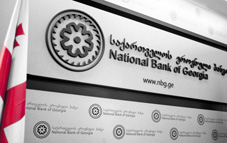According to NBG financial system is sustainable towards potential shocks
By Natalia Kochiashvili
Thursday, May 30


In addition to the decrease in excess credit growth, the positive trends have also been revealed, in particular, the service and the ensuring ratios are improving and, consequently, the loans issued with the high credit burden are reducing.
As for the crediting of natural persons, according to the NBG, the number of consumer loans continue to decrease, while mortgage loans unlike the beginning of the year are now characterized by an upward trend. The share of mortgage loans issued in Lari is very high.
"Beginning in 2019, consumer credits keep reducing while mortgage loans continue increasing. The share of loans issued in the national currency Lari is growing," says NBG.
According to the Committee, a resource for lending to legal entities increases on the back of reduced consumer loans. In April, the annual growth of loans to legal entities amounted to 12.8 percent.
"In addition, there is a reduction in interest rates on loans issued in Lari, which is a contributing factor in economic growth," the National Bank said.
Regulations on responsible lending practice mean that commercial banks in Georgia are restricted in issuing loans without meaningful analysis of consumers' solvency. The total amount of these loans must not exceed 25 percent of the supervisory capital of commercial banks.
The Financial Stability Committee of the National Bank of Georgia left the counter-cyclic buffer unchanged at 0 percent. Koba Gvenetadze, the President of the National Bank, held a briefing on the details of the decision. The National Bank estimates that the financial system is sustainable towards potential shocks. The banking sector is highly capable and maintains a high level of profitability, while the share of inactive loans remains at the lowest level in total lending. However, it should be noted that in the ascending phase of the credit cycle, the share of inactive loans is usually characterized by decline. Therefore, it should not be too optimistic about evaluating this indicator.
The National Bank of Georgia states that the Ministry continues to monitor the financial stability of the country, assessing domestic and foreign risks and will use all the instruments available at its disposal to minimize possible risks.
The next meeting of the Financial Stability Committee will be held on September 18, 2019.
The President of the National Bank also commented on Lari issues. Must be noted, that the NBG's official course is 2.7876, which is the highest in the history of Lari. The previous record was recorded on December 22, 2016. Koba Gvenetadze names the dollar strengthening trend and Turkish Lira rate among the reasons for the depreciation of the Lari; as well as occasional and exogenous factors such as the effect of the excise (1.3%), increase of oil prices. According to him, the annual inflation of 4.1percent is moderate.
Many factors affect the exchange rate and the information about most of them will be available within a few months. "That is why it is not always possible to explain the dynamics of the currency rate, which is why central banks, as well as international organizations, are not making comments on current courses and short-term fluctuations." – said President of NBG.
He said that, in general, fundamental factors improved, but at the moment, it is impossible to see the full picture, because the first quarter balance of payments will be known later.
According to Gvenetadze: "The bigger factor is the tendency of dollar strengthening, and this year, this index is rising. At the same time, the Turkish Lira is depreciated, that affects Lari as well. But since the floating exchange rate has a function of 'devouring,' it can be said that in equal conditions, depreciation of this kind is usually followed by reinforcement." As NBG president noted, in this regard to the statistical information of the past three years is remarkable.
In addition, according to the National Bank's President, the issue of international reserves is also important: "The NBG's international reserves have been inadequate for a long time, but at this stage, the volume of reserves has become close to the minimum adequate level, which is important for the country. This means that in the future there is no need for the active purchase of reserves. Of course, we will continue to care for reserves. We have been buying during the period of strengthening, but at this stage, there is no need for active procurement of reserves," noted NBG president.
